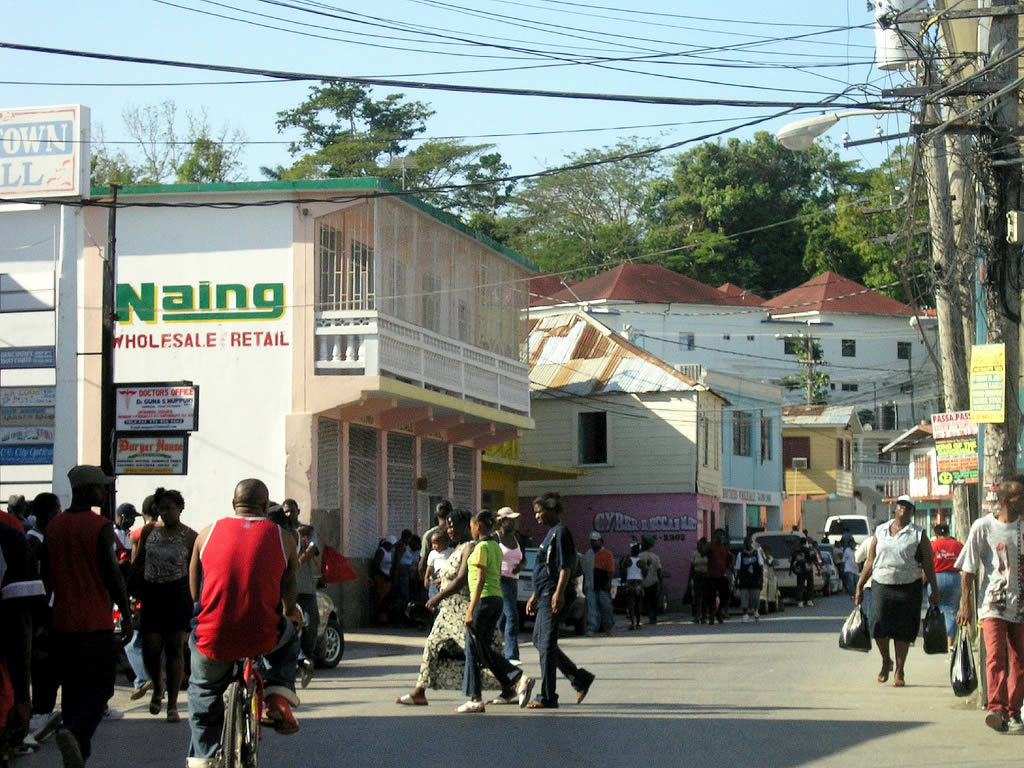The Health Policy Project ended in 2016. Work continued under Health Policy Plus (HP+) until 2022.
NEWS & VIEWS
October 18, 2013
 |
| Scene from a Jamaican market street. Photo by Gail Frederick. |
KINGSTON, Jamaica —Jennifer is a confident, poised beautician and the mother of four children, whom she supports. She has been HIV positive for 12 years. She lives in an environment where prevailing attitudes and discrimination toward HIV-positive people undermine access to treatment and care, in part because of the prevalence of stigma. Stigma and discrimination based on HIV status present a real threat for Jennifer as well as countless others living with HIV in Jamaica. Even walking down the street with someone known to be HIV-positive can subject a person to harm. “I’ve seen peers get burnt out of their house,” says Jennifer.
After Jennifer became infected, her white blood cell count dropped dangerously low. She was afraid to seek treatment, as she had heard that breaches in confidentiality at the health center were one of the way the community learns about who is HIV positive. She anticipated being targeted for stigma and discrimination if her HIV status was disclosed and had to choose between dying and fighting to live. Jennifer chose to seek treatment and for the past two and half years she has been championing her own rights and the rights of others living with HIV.
Through Greater Involvement of People living with AIDS (GIPA) National Capacity Building Programme, a group supported by the USAID-funded Health Policy Project, Jennifer began to share her experiences living with HIV with large audiences. GIPA trains leaders to advocate and educate communities to reduce HIV-related stigma and discrimination, including gender-based violence. GIPA members participate as a leadership group that commits to a series of trainings over a 6-month period to build depth of knowledge about HIV; unpack root causes of stigma, discrimination and gender-based violence; and grow skills and confidence to be able to strengthen their leadership in the spaces where they are active - ranging from peer support groups, to workplaces with HIV education programs, to community faith-based organizations, to decision-making bodies such as the Global Fund for AIDS, TB and Malaria Country Coordinating Mechanism. As part of the process, PLHIV leaders also benefit from the unique opportunity for ongoing exchange of experiences and building of linkages among a diverse range of PLHIV leaders across the island, with the specific focus on enhancing their roles as leaders. Members are part of a growing network of civil society organizations in Jamaica, where approximately 1.7 percent of the population lives with HIV.
Working with GIPA, Jennifer has helped sensitize many in her community to HIV and those living with the virus. Recently, she shared her life experiences with a church group in her community. At the end of her story the 200-member congregation was full of questions: ‘What’s it like to live with HIV?’, ‘How did your parents respond to your diagnosis?’, and ‘How did you disclose your status?’ She is now willing to share her HIV status with groups interested in learning from her. With the support of GIPA and the network that has connected her with other HIV-positive leaders, Jennifer continues to shift perceptions, attitudes, and knowledge of what it’s like to live with the virus.
“When I got infected with HIV,” Jennifer says, “I thought it was the end of the world. But when I went to my treatment site, I realized it’s not only me, but any man, woman, boy or girl that can be affected.”
Jennifer sees opportunities for HIV-positive people to be effective and strong leaders in the national response to HIV. After all, she says, “We are the ones who have to take the pills and who have to go through all the side effects. We not only help those managing their positive status, but we are a living testimony for all people and can reach them through the message of prevention. Together we are greater than AIDS.”
What's New
- Something to Build On: “Innovation Exchange” Celebrates the Health Policy Project’s Close and a New Beginning
- What Will it Take for Tanzania to Achieve ART Targets and Ensure Long-Term Sustainability of the HIV Response?
- Helping Kenya’s County Leaders Advocate for Increased Health Investments
- HPP Holds Working Meeting on Ensuring Responsible PEPFAR Transitions for Key Populations
- Health Policy Project Celebrates 2016 International Women's Day
- HPP Staff Participate in White House Conference on HIV Stigma Reduction

